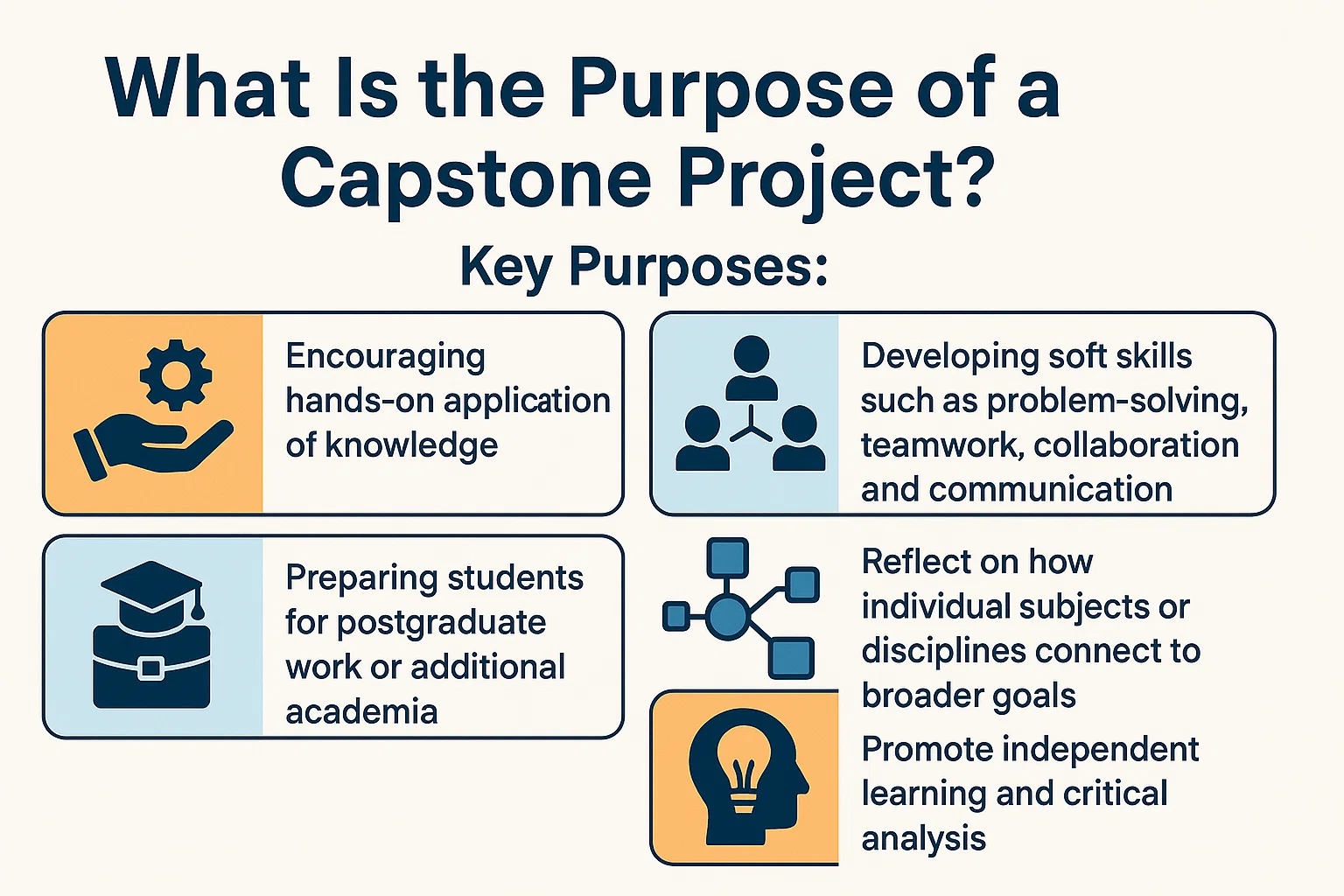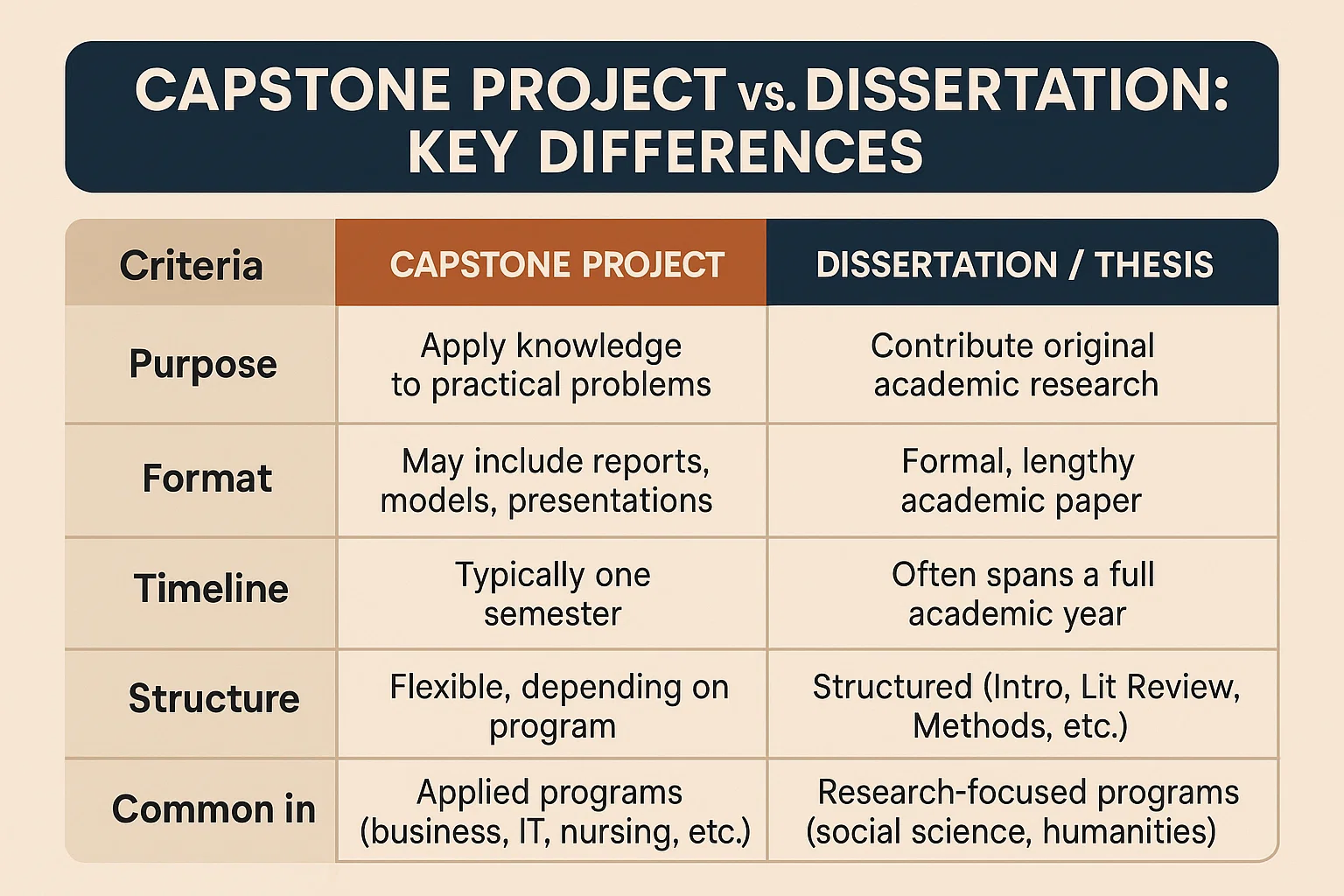
Capstone projects are on the rise in universities and professional courses around the world. But what is a capstone project? Is it a research paper, a presentation, a prototype, a final reflection? Or all of it?
This guide will explain the meaning of a capstone project, what it is meant to achieve, what it looks like (its structure), and real life capstone project examples, so you can understand what is at stake and how you can participate with confidence. Whether you are getting ready to write one, or you are simply trying to make sense of capstone projects means, this article breaks it all down into practical formats that are meant to be student-friendly.
What Is a Capstone Project?
A capstone project is meant to be the completion of everything a student has also learned in the course or program. Usually in the final year of study, learners take theory and apply it to a problem, whether real-world or research-focused.
In other words, the meaning of a capstone project is to connect knowledge with hands-on application.
Capstone Projects Means:
A multi-phase, integrative project designed to:
- Showcase your academic journey
- Apply your knowledge to real or professional problems
- Promote critical thinking, inquiry, and collaboration
In other words, a capstone project is to create something of utility and significance which embodies your entire experience as a scholar, be it a paper, or presentation, or software, or report, or campaign.
What Is the Purpose of a Capstone Project?

Capstone projects are very purposeful: They create real-life knowledge from academic knowledge and experiences. Capstone projects allow students to demonstrate their learning in a product developed independently, in lieu of demonstrating their knowledge through a typical exam.
Key Purposes:
- Encouraging hands-on application of knowledge
- Developing soft skills such as problem-solving, teamwork, collaboration, and communication
- Preparing students for postgraduate work or additional academia
- Reflect on how individual subjects or disciplines connect to broader goals
- Promote independent learning and critical analysis
Capstone projects vary tremendously depending on many factors: your discipline, type of institution, or program description. For example, some capstone projects will have a group work element, while others will have individual work.
Some capstone projects may focus heavily on research and other capstone projects may involve engineering design, product development, or other creative or technical execution!
What Does a Capstone Project Involve?
Naturally, a capstone project will differ from one’s field of study, the nature of the institution, and the kind of program being taken. In some cases, capstone projects are tackled both individually and in groups, while some may involve a hefty amount of research.
In other instances, the capstone is a result of an engineering design, product development, or some other form of creative or technical implementation.
Common Elements:
- Proposal Stage – Submit a project idea and outline for approval
- Research & Planning – Gather data, build frameworks and plan deliverables
- Execution – Develop the final product like (paper, prototype, presentation, etc.)
- Final Submission – Submit the project with written documentation
- Presentation/Defense – Present findings to a faculty panel or public audience
Capstone projects are typically completed or take place over a semester or maybe sometimes longer and have a faculty advisor or mentor.
What Are Some Common Capstone Project Examples?
If you are wondering what is a capstone project in practice, here are some actual capstone project examples from a range of fields, to help you as you brainstorm ideas for your own project, or to give you an understanding of what kind of work and deliverables you can expect.
Capstone Project Examples by Discipline:
Business Administration
- Launching a marketing campaign for a local business
- Creating a business plan for a startup idea
- Conducting financial analysis for a non-profit
Computer Science / IT
- Developing a mobile application or software tool
- Creating a cybersecurity framework for a small business
- Building a database system for school records
Education
- Designing a curriculum plan for a specific age group
- Conducting field research on classroom management strategies
- Creating an educational podcast series for high school students
Nursing / Healthcare
- Implementing a patient care improvement plan
- Creating health awareness programs for rural communities
- Studying burnout rates among nursing staff in emergency departments
Environmental Science
- Creating a waste reduction plan for a community
- Measuring water quality in a local area
- Proposing an urban green space redesign
Engineering
- Designing a renewable energy model for rural electrification
- Building a smart irrigation system for sustainable agriculture that adapts to soil and weather data
- Creating a prototype for net-zero housing
Media / Communications
- Producing a short documentary
- Launching a social media campaign around mental health
- Designing a PR strategy for a hypothetical brand
In these capstone project examples, you can see a variety of formats and levels of flexibility. But the intention has always been the same - you are documenting your learning, as you engage in solving a problem in the real world.
How Is a Capstone Project Different from a Dissertation?

A lot of students confuse capstone projects with dissertations or theses. While both are final projects, they differ in focus and format.
|
Criteria |
Capstone Project |
Dissertation / Thesis |
|
Purpose |
Apply knowledge to practical problems |
Contribute original academic research |
|
Format |
May include reports, models, presentations |
Formal, lengthy academic paper |
|
Timeline |
Typically one semester |
Often spans a full academic year |
|
Structure |
Flexible, depending on program |
Structured (Intro, Lit Review, Methods, etc.) |
|
Common in |
Applied programs (business, IT, nursing, etc.) |
Research-focused programs (social science, humanities) |
The two options each have separate benefits, but capstone projects stand out because of their hands-on approach.
What Skills Do Capstone Projects Help You Develop?
Developing a capstone project helps you grow as a student and as a professional. Many of the skills you will develop in this are career applicable.
Key Skills Gained:
- Project management – From timeline planning to execution
- Research and analysis – Exploring detail from data to reach conclusions
- Communication – Writing and presenting results clearly
- Teamwork – Working with peers or stakeholders
- Creativity and innovation – Thinking outside of the textbook
- Problem-solving – Addressing real issues with practical solutions
Employers are placing more and more value on graduates demonstrating applied skills - and a well executed capstone is strong evidence of that.
Industry Specific Capstone Project Topic Ideas
Struggling to come up with a topic? Here are a few broad capstone project examples ideas you can explore or adapt depending on your course:
Business:
- How do small businesses survive recessions with digital tools?
- What does influencer marketing do to Gen Z’s buying habits?
Education:
- How do hybrid models work for student outcomes?
- Can gamification really help primary students focus and stay engaged?
Healthcare:
- How does telemedicine affect patient trust and diagnosis quality?
- Do community health workshops make people more aware of lifestyle diseases?
Technology:
- AI is transforming accessibility — can it create better tools for visually impaired students?
- Smart homes designed to improve the safety of elderly users.
Environment:
- Plastic bans affect both businesses and households — what is their true economic impact?
- Cities are turning to urban farming — can this reduce food insecurity?
Choose a topic that’s relevant, interesting to you and feasible within your resources and timeline.
Tips to Succeed in a Capstone Project
Success in a capstone project is all about planning, persistence and feedback.
Here’s what works:
- Start Early – Don’t wait until the last minute to choose your topic
- Create a Timeline – Break the work into manageable chunks
- Communicate Regularly with Mentors – Get feedback and stay on track
- Document Everything – Keep notes, references and progress logs
- Practice Your Presentation – Know your stuff and explain it clearly
- Reflect on the Process – Write a short reflection to show what you learned
Your capstone is not just about the end product, but the journey.
Final Thoughts
Now that you know what capstones are, the meaning of a capstone project, and how they are similar to and different from projects in other fields, you can start getting ready for your capstone.
Capstones are not requirements to graduate. They are an opportunity to show your thinking, problem solving and application of learning to real world situations.Whatever your project looks like (developing a prototype; investigating a community issue; developing a campaign; etc), your capstone is a chance to show what you can do, and these capstone project examples prove how flexible the format can be.
Looking for help with your Capstone?
If you need help with developing or choosing a topic, writing your report or presenting your findings our academic team can assist you. We help students build, refine and complete their capstones with confidence, making sure you understand exactly what capstone projects means in your academic journey.









Loved reading this Blog? Share your valuable thoughts in the comment section.
Add comment